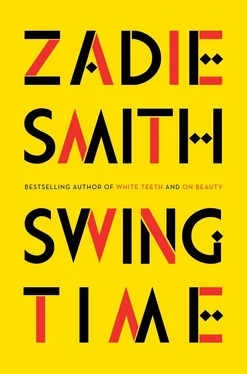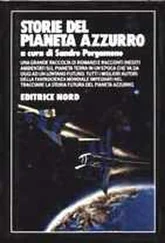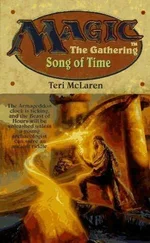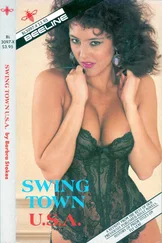Thirteen
We stood on the balcony. Tracey held up a cigarette, stolen from my father, and I stood ready to light it for her. Before I could she spat it from her mouth, kicked it behind her and pointed down at my mother, who, as it turned out, was right below us on the communal lawn, smiling up. It was a mid-May Sunday morning, warm and bright. My mother was waving a dramatically large spade, like a Soviet farmer, and wearing a terrific outfit: denim dungarees, thin, light brown crop top, perfect against her skin, Birkenstocks and a square yellow handkerchief folded into a triangle and worn over her head. This was tied at the back of her neck in a jaunty little knot. She was taking it upon herself, she explained, to dig up the communal grass, a rectangle about eight foot by three, with the idea of establishing a vegetable garden that everybody could enjoy. Tracey and I watched her. She dug for a while, pausing regularly to rest her foot on the lip of the shovel and to shout up to us about lettuces, the various strains, the right time for planting them, none of which interested us in the least, and yet everything she said was made somehow more compelling by that outfit. We watched as several other people came out of their flats, to express concern or query her right to do what she was doing, but they were no match for her, and we noticed and admired the way she dispatched the fathers in a few minutes — essentially by looking into their eyes — while with the mothers she met with resistance, yes, with the mothers she had to make a little more effort, drowning them in language until they understood how out of their depth they were and the thin stream of their objections was completely subsumed by the quick-running currents of my mother’s talk. Everything she said sounded so convincing, so impossible to contradict. It was a wave washing over you, unstoppable. Who didn’t like roses? Who was so small-minded they would begrudge an inner-city child the chance to plant a seed? Weren’t we all Africans, originally? Weren’t we people of the land?
It started to rain. My mother, not dressed for rain, returned indoors. The next morning before school we were excited to catch up with this spectacle: my mother, looking like Pam Grier herself, digging a large, illegal hole without permission from the council. But the spade lay exactly where she had left it and the trench filled with water. The hole looked like somebody’s half-dug grave. The next day it rained again and no more digging was done. On the third day a gray sludge began to rise up and spill into the grass.
“Clay,” said my father, digging a finger into it. “She’s got a problem now.”
But he was wrong: it was his problem. Someone had told my mother that clay is only a layer of the earth, and if you dig deep enough you can get past it, and then all you have to do is go to the garden center and get some compost and pour it into your large, illegal hole… We peered down into the hole my father was now digging: under the clay was more clay. My mother came downstairs and peered in, too, and claimed to be “very excited” about the clay. She never again mentioned vegetables, and if anyone else tried to mention them she seamlessly adopted the new party line, which was that the hole had never been about lettuces, the hole had always been a search for clay. Which had now been found. In fact, she had two potter’s wheels, just sitting upstairs! What a wonderful resource for the children!
The wheels were small and very heavy, she had bought them because she “liked the look of them,” one freezing February when the lift doors malfunctioned: my father braced his knees, squared his arms and lugged the bloody things up three flights of stairs. They were very basic, brutal in some way, a peasant’s tool, and they had never been put to any use in our flat besides propping open the door to the living room. Now we would use them, we had to use them: if we didn’t, my mother had dug a large hole in the communal gardens for no reason at all. Tracey and I were told to collect children. We managed to convince only three kids from the estate: to make up numbers we added Lily Bingham. My father scooped clay into carrier bags and carted it up to the flat. My mother put a trestle table on the balcony and dropped a large lump of clay in front of each of us. It was a messy process, we probably would have been better off doing it in the bathroom or the kitchen, but the balcony allowed for an element of display: from up there my mother’s new concept in parenting could be seen by all. She was essentially asking the whole estate a question. What if we didn’t plonk our children in front of the telly each day, to watch the cartoons and the soap operas? What if we gave them, instead, a lump of clay, and poured water over it, and showed them how to spin it round until a shape formed between their hands? What kind of a society would that be? We watched the clay being spun between her palms. It looked like a penis — a long, brown penis — though it was only when Tracey whispered this idea into my ear that I allowed myself even to acknowledge the thought I was already having. “It’s a vase,” claimed my mother, and then added, as clarification: “For a single flower.” I was impressed. I looked around at the other children. Had their mothers ever thought to dig a vase out of the earth? Or grow a single flower to be placed inside it? But Tracey was not taking it at all seriously, she was still beside herself at the idea of a clay penis, and now she set me off, and my mother frowned at us both and, turning her attention to Lily Bingham, asked her what she would like to make, a vase or a mug. Under her breath, Tracey suggested, again, the obscene third option.
She was laughing at my mother — it was liberating. I had never imagined my mother could or should be a figure of fun, and yet Tracey found everything about her ridiculous: the way she spoke to us with respect, as if we were adults, giving us choices about things Tracey felt we had no business at all in choosing, and the license she gave us generally, allowing us to make all this unnecessary mess on her balcony — when everyone knew a real mother hated mess — and then having the cheek to call it “arts,” the cheek to call it “crafts.” When Tracey’s turn came round and my mother asked her what she would like to make on the wheel, a vase or a mug, Tracey stopped laughing and scowled.
“I see,” said my mother. “Well, what would you like to make?”
Tracey shrugged.
“Doesn’t have to be useful,” my mother pressed. “Art means not having to be useful! In West Africa, for example, a hundred years ago, there were some village women, they were making these strangely shaped pots, impractical pots, and the anthropologists couldn’t understand what they were doing, but that was because they, the scientists, were expecting a quote unquote ‘primitive’ people to make only useful things, when actually they were making the pots just for their beauty — no different from a sculptor — not to collect water, not to hold grain, just for their beauty, and to say: we were here, at this moment in time, and this is what we made . Well, you could do that, couldn’t you? Yes, you could make something ornamental. That’s your freedom! Take it! Who knows? You might be the next Augusta Savage!”
I was used to my mother’s speechifying — I tended to tune out whenever it was happening — and I was familiar, too, with the way she would drop whatever she happened to be studying that week into ordinary conversation, but I’m sure Tracey had never heard anything like it before in her life. She didn’t know what an anthropologist was, or what a sculptor did, or who Augusta Savage was, or even what the word “ornamental” meant. She thought my mother was trying to make a fool of her. How could she know my mother found it impossible to speak in a natural way to children?
Читать дальше












